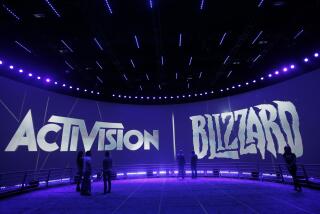EU likely to OK Google deal
- Share via
BRUSSELS — European regulators are likely to approve Google Inc.’s $3.1-billion takeover of ad firm DoubleClick Inc., despite rivals’ worries that the deal could squeeze them and make Web advertising more expensive.
The European Commission, which is in charge of preserving competition in the 27-country European Union, is about to decide whether it will express serious doubts about the deal, which would combine Mountain View, Calif.-based Google’s dominance in pay-per-click Internet advertising with New York-based DoubleClick’s market-leading position in display ads.
But commission-watchers say Brussels is likely to follow suit after the deal won U.S. approval in December. For six years the commission has given the green light to every all-U.S. merger that passed muster in Washington.
A lawyer acting for a client concerned about the deal said it was “disappointing but true” that the commission had not sent Google a “statement of objections” -- a formal outline of its problems with the deal.
“If they had serious doubts, we’re at the point where . . . if you don’t send [such a statement], you don’t have time to complete the case,” the lawyer said.
Given the EU watchdog’s track record, probably the best that critics can hope for is that it will impose some conditions to safeguard competition. The commission will make its final decision by April 2.
Google’s rivals say DoubleClick knows where they sell ads and for how much, and that if Google owned DoubleClick it would have that sensitive proprietary information.
Among its services, DoubleClick is part of a chain that helps advertisers get their ads placed on websites where they have the highest chance of reaching likely customers. DoubleClick software takes into account demography, website content, keywords and other information.
It then funnels the advertising of its clients down the chain to one of several ad networks, such as Google’s AdSense, which work directly with websites.
DoubleClick uses a sophisticated algorithm -- a step-by-step mathematical formula -- to match ads to Web pages. The algorithm is tweaked to handle new information in the marketplace.
DoubleClick also reports to advertisers, telling them whether their ads were seen by the people they tried to reach.
Rivals and customers contend that if Google owned DoubleClick it could shift the algorithm, subtly favoring Google’s own AdSense rather than other merchants.
Google’s preeminence in Web searching gives it dominance in search ads, but rivals and customers say the adjacent market for display ads has held down prices.
They say search and display advertising could converge after a merger, allowing Google to raise prices.






